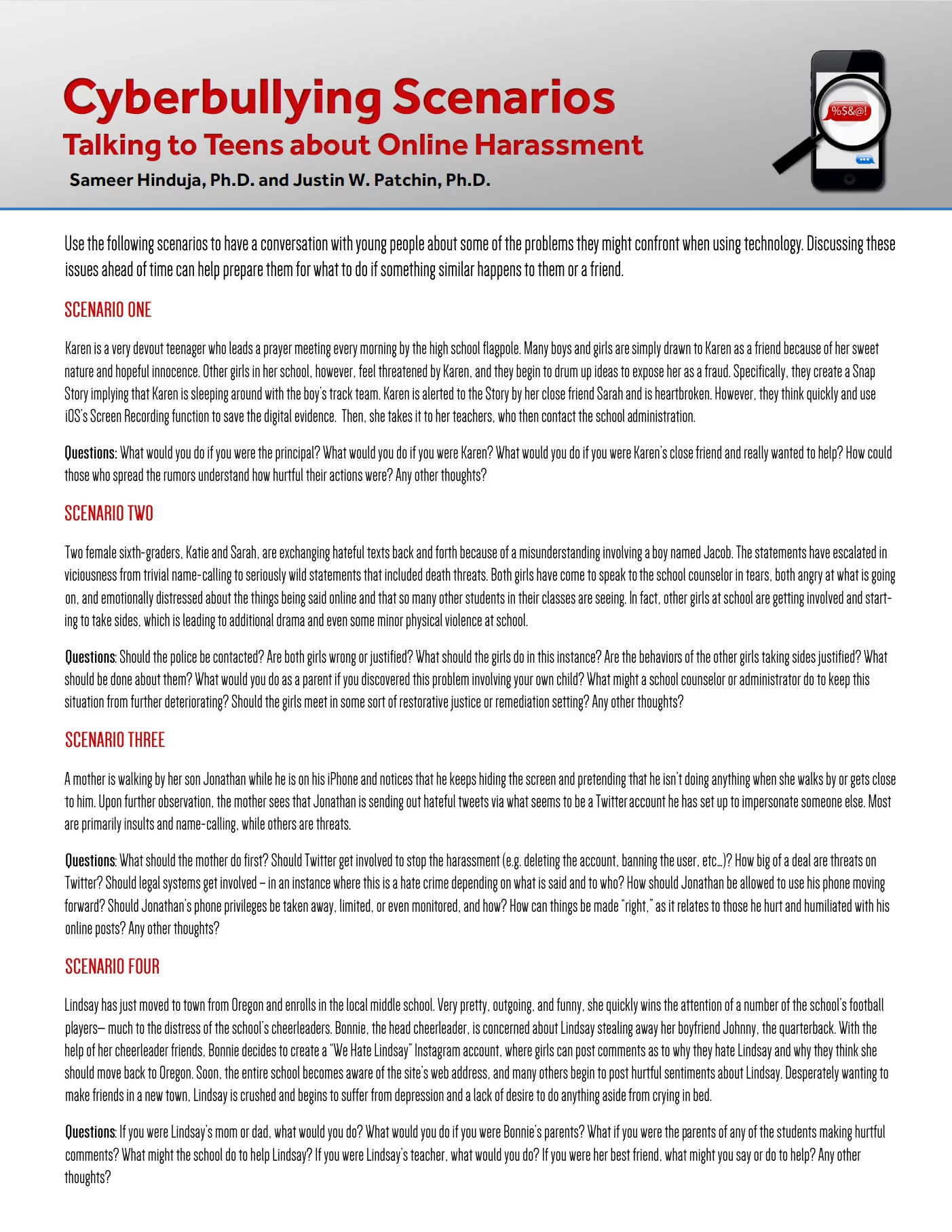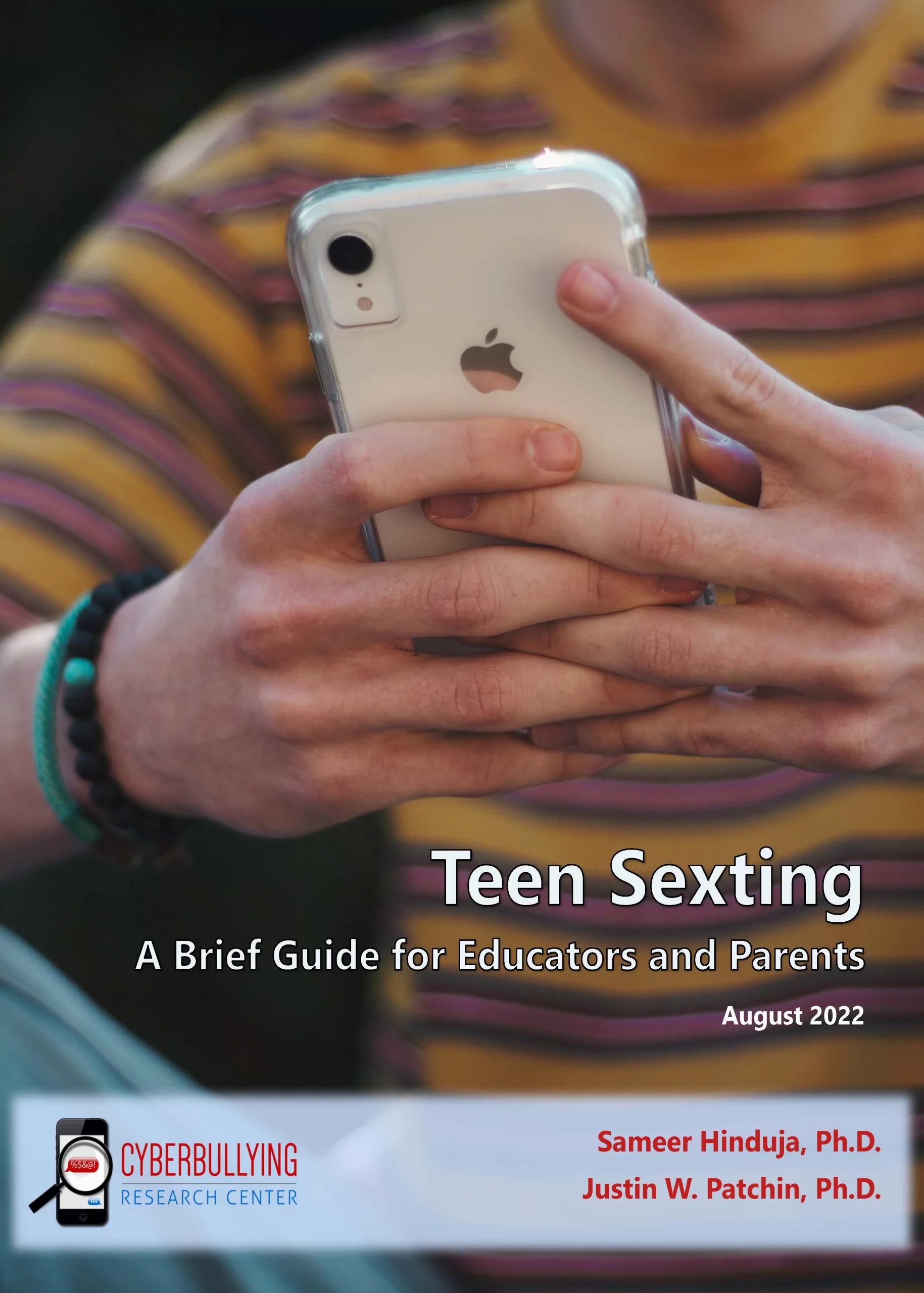
Addressing Youth Sexting Through Rational Legislation and Education
Sexting is defined as “the sending or receiving of sexually explicit or sexually suggestive images or videos,” usually via mobile devices. Our research indicates that at least 14% of US middle and high school students report that they have sent explicit images to others, while about 23% have received these kinds of images from their […]

The Nature and Extent of Youth Sextortion: Legal Implications and Directions for Future Research
Sextortion, the threatened dissemination of explicit, intimate, or embarrassing images of a sexual nature without consent, is an understudied problem. Despite a recent increase in reported incidents among adolescents in the United States, little is known about the nature and extent of sextortion among this population. The current research explores sextortion behaviors among a national […]

Social Media and Tech Misuse Scenarios
This resources provides scenarios that parents, educators, and other adults can use to discuss issues that may come up when young people are using technology. Hinduja, S. & Patchin, J. W. (2023). Social Media and Tech Misuse Scenarios. Cyberbullying Research Center. Retrieved [insert date], from https://cyberbullying.org/Social-Media-and-Tech-Misuse-Scenarios.pdf Download the Scenarios

Take it Down: A New Tool to Combat the Unauthorized Sharing of Explicit Images of Minors
It has long been stressed that once you send an image to someone else, or post it online, you lose complete control over how that image is used and where it might end up. While this is still mostly true, the National Center for Missing and Exploited Children (NCMEC), with funding from Meta, has developed […]

School Administrators Charged with Child Exploitation After Investigating Sexting
Last spring, Brush High School (Brush, Colorado) assistant principal Bradley Bass was alerted to a student sexting issue at his school. He and secondary schools director Scott Hodgson looked into it. They talked to some students who were reportedly involved, and determined that intimate images had been shared consensually. At least one student voluntarily showed […]

Model Sexting Law
In my last post, I discussed what I learned in reviewing all of the state sexting laws across the U.S. Some states have comprehensive sexting laws while many others—23 to be exact—have no sexting specific law whatsoever. As noted in my post, this is problematic for a number of reasons, including the risk that minors […]

The Status of Sexting Laws Across the United States
As of July 1, 2022, 23 states in the U.S. do not have laws specific to teen sexting. Our research shows that approximately 14% of middle and high school students have sent explicit images to others, while about 23% have received similar images from others. Likewise, a 2022 meta-analysis of 28 studies published between 2016 […]

Teen Sexting: A Brief Guide for Educators and Parents
This research summary reviews what is currently known about teen sexting. Research from across the United States is discussed, along with practical solutions for parents, educators, and other adults to prevent and respond to teen sexting. Citation information: Hinduja, S. & Patchin, J. W. (2022). Sexting – A Brief Guide for Educators and Parents. Cyberbullying […]

Michigan Teen Latest Casualty of Sextortion
Seventeen-year-old Jordan DeMay seemed to have it all going for him: he was handsome, athletic, and was finishing his senior year at Marquette Senior High School in Marquette, Michigan. He was Homecoming King. When a pretty girl he didn’t know messaged him on Instagram and asked to exchange intimate images, he was skeptical. After a […]

Teen Sexting: Advice for Parents
(For a formatted .pdf version of this article for distribution, click here]). Sexting is when someone takes a naked or semi-naked (explicit) picture or video of themselves, usually using their phone, and sends it to someone else. Some teens participate in sexting voluntarily as a way to flirt or be intimate with a romantic partner, […]

